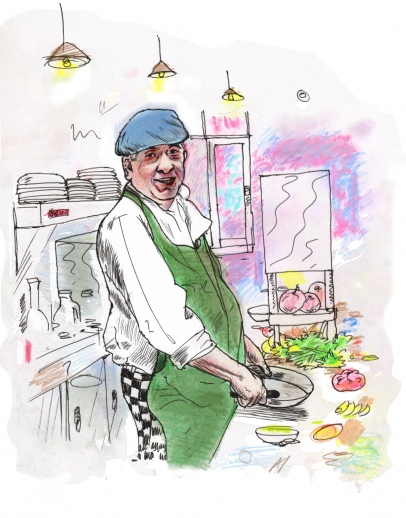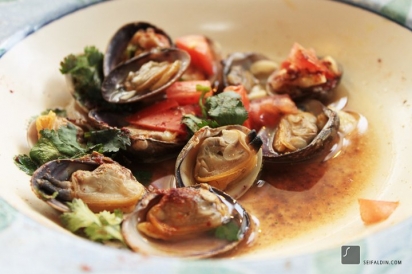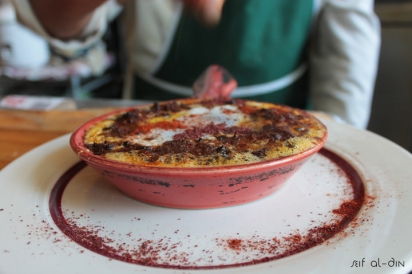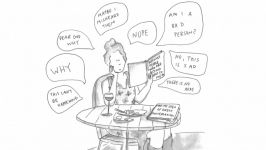A Taste of the Current State of Chivalry
Chivalry isn’t dead. In fact, I found it in Astoria.
Chivalry isn’t dead, but it doesn’t just pertain to women anymore. It doesn’t discriminate based on sexual inclinations or simply hold the door open for the elderly. Chivalry is alive and well at a cozy Egyptian cafe on Steinway street.
“I like your hat,” said Ali El Sayed, owner of Kabab Cafe, when I walked in. “Are you hungry?”
I chose a small table for two, one of few options, and began stripping my many layers of clothing that shielded me from the cold.
“Are you alone?” he asked as he came out from behind the counter to help me settle me into my spot. “I like that too,” he smiled warmly.
El Sayed didn’t offer me a menu, rather read off the dishes he was offering that day: beet salad with onion, roasted cauliflower with pomegranate reduction, a hearty lamb shank and ragu of lamb heart. I took a moment to consider my options while he made me a cup of mint tea with fresh herbs to match the one in his hand.
“Do you have any allergies?” he asked when I decided to let him prepare me whatever he saw fit. He was the only one working the restaurant that night, playing the role of host, cook, busser and house entertainer. Steam from the warm pita rose high against the window revealing the darkness of the night’s sky. The counter was full of fresh ingredients he picked up that day–even in the snow–himself.
"Welcome to my home. It is yours now. I will be in the kitchen if you need anything," I felt the restaurant whisper to me as El Sayed went back to chopping and singing along to the evening’s soundtrack he surely selected.
El Sayed moved my hat off the table and set down a large meze platter filled with hummus, fava beans with garlic and lemon, falafel, and the most delightful, smoky baba ganoush I’ve encountered. He asked if I “liked spicy” and brought a mixture of roasted vegetables and garlic served in a half shell for dipping.
“Eat with your fingers,” he said while demonstrating how to pick up the roasted kale. A welcomed tactic for a woman who always ends up with kale in her hair, I nodded and followed suit, licking the bit of oil before fishing out sliced apples sprinkled with spice sprinkled from one of the dips on the plate. “How is it my dear?” he asked from behind the counter. “Tea is coming.”
I was savoring the slight-sweetness of the lamb meat when he brought my drink made with hot water from a worn stainless steel kettle. “Thank you,” I said as he placed it on the table. “No, I thank you,” El Sayed answered before serving the couple behind me lamb cheeks in mint sauce.
He returned to my table a few minutes later. “How are you, little girl? Happy?” he asked. I sighed with contentment but mentioned I could use a little wine as an aperitif. “Some for you, some for me,” he said as he poured us two small glasses of organic red wine from California. “Salud.”
A woman from one of the other six tables asked if something on her plate was homemade and he quickly answered that all of his dishes are made from scratch. A family walked in and he greeted the father with a “What’s up my brother?” as they moved toward the back. “Everything is moveable,” El Sayed said of the burgundy seats and wood tables. The restaurant is small enough to feel like we were all dining together, but separated so I didn’t feel the need to make small talk with the other patrons.
"Come in from the cold. Warm your toes. We need not worry what awaits us on the outside," I sensed the restaurant say. Everyone felt just as welcomed as I did.
El Sayed ladled pomegranate sauce onto a plate while chatting with the family who had just arrived. “I’m going to miss you, my brother,” he said to the father when they told him they were leaving for their home state of Hawaii soon. “Buy me a ticket and I will come with you,” he joked about opening an Egyptian restaurant on the island. They referenced Hawaii’s state origins along with the Dole Food Company’s effect on the natives. “That is why it became a state in the first place–to destroy it,” the father told El Sayed.
I finished almost everything on my plate at this point, but lingered to watch the couple leave to have a cigarette on the other side of the glass door and kiss goodnight. They parted ways as El Sayed chopped onions and sang along to Johnny Cash. “Ba du ba doo” my now-two favorite men sang together in harmony while El Sayed cleared the couple’s plates.
I didn’t want to leave Kabab Cafe that night. I wanted to stick around for more wine with El Sayed, ask him how he ended up here, and why, exactly, he said he loved Eddie Murphy so much. I dug around in my wallet to find I only had 25 dollars. Not enough to fake continued hunger.
“How’s my lady?” he asked when I started bundling back up. “Are you leaving me already?”
I paid my bill, still able to tip generously with everything left of my cash, and asked him to write down what I ate in my little notebook. His penmanship was exactly as I anticipated: romantic and almost unreadable.
“What’s your name?” he asked me. “Alexandria! That is where I am from,” he beamed.
“Some people ask why I come to this country,” he paused, inviting me to take a guess though I hadn’t asked the question.
“To make great food?” I answered.
“Exactly,” he agreed. “We love you!” El Sayed said as I left.
I didn't bother to ask what he meant by “we," because it didn’t matter. At Kabab Cafe, the psychical space felt like a family, and coming from El Sayed, I digested it as truth.








